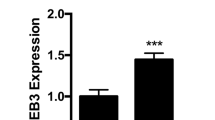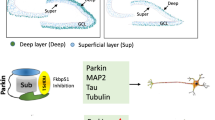Abstract
Neuropsychiatric disorders have a high incidence worldwide. Kinesins, a family of microtubule-based molecular motor proteins, play essential roles in intracellular and axonal transport. Variants of kinesins have been found to be related to many diseases, including neurodevelopmental/neurodegenerative disorders. Kinesin-12 (also known as Kif15) was previously found to affect the frequency of both directional microtubule transports. However, whether Kif15 deficiency impacts mood in mice is yet to be investigated. In this study, we used the CRISPR/Cas9 method to obtain Kif15−/− mice. In behavioral tests, Kif15−/− female mice exhibited prominent depressive characteristics. Further studies showed that the expression of BDNF was significantly decreased in the frontal cortex, corpus callosum, and hippocampus of Kif15−/− mice, along with the upregulation of Interleukin-6 and Interleukin-1β in the corpus callosum. In addition, the expression patterns of AnkG were notably changed in the developing brain of Kif15−/− mice. Based on our previous studies, we suggested that this appearance of altered AnkG was due to the maladjustment of the microtubule patterns induced by Kif15 deficiency. The distribution of PSD95 in neurites notably decreased after cultured neurons treated with the Kif15 inhibitor, but total PSD95 protein level was not impacted, which revealed that Kif15 may contribute to PSD95 transportation. This study suggested that Kif15 may serve as a potential target for future depression studies.





Similar content being viewed by others
Data availability
The data that support the findings of this study are available on reasonable request from the corresponding author.
References
Alshaya DS (2022) Genetic and epigenetic factors associated with depression: An updated overview. Saudi J Biol Sci 29:103311. https://doi.org/10.1016/j.sjbs.2022.103311
Bakhtiarzadeh F, Nahavandi A, Goudarzi M, Shirvalilou S, Rakhshan K, Niknazar S (2018) Axonal transport proteins and depressive like behavior, following Chronic Unpredictable Mild Stress in male rat. Physiol Behav 194:9–14. https://doi.org/10.1016/j.physbeh.2018.04.029
Barry J, Gu Y, Jukkola P et al (2014) Ankyrin-G directly binds to kinesin-1 to transport voltage-gated Na+ channels into axons. Dev Cell 28:117–131. https://doi.org/10.1016/j.devcel.2013.11.023
Burhan-Cavusoglu P, Iscan E, Gunes A, Atabey N, Alkin T (2021) Increased telomerase activity in major depressive disorder with melancholic features: Possible role of pro-inflammatory cytokines and the brain-derived neurotrophic factor. Brain Behav Immun Health 14:100259. https://doi.org/10.1016/j.bbih.2021.100259
Choi K, Lee J, Kang HJ (2021) Myelination defects in the medial prefrontal cortex of Fkbp5 knockout mice. FASEB J 35:e21297. https://doi.org/10.1096/fj.202001883R
Chu D, Li L, Jiang Y et al (2019) Excess folic acid supplementation before and during pregnancy and lactation activates fos gene expression and alters behaviors in male mouse offspring. Front Neurosci 13:313. https://doi.org/10.3389/fnins.2019.00313
De Vos KJ, Grierson AJ, Ackerley S, Miller CC (2008) Role of axonal transport in neurodegenerative diseases. Annu Rev Neurosci 31:151–173. https://doi.org/10.1146/annurev.neuro.31.061307.090711
Dong Z, Wu S, Zhu C et al (2019) Clustered regularly interspaced short palindromic repeats (CRISPR)/Cas9-mediated kif15 mutations accelerate axonal outgrowth during neuronal development and regeneration in zebrafish. Traffic 20:71–81. https://doi.org/10.1111/tra.12621
Dwivedi Y, Rizavi HS, Conley RR, Roberts RC, Tamminga CA, Pandey GN (2003) Altered gene expression of brain-derived neurotrophic factor and receptor tyrosine kinase B in postmortem brain of suicide subjects. Arch Gen Psychiatry 60:804–815. https://doi.org/10.1001/archpsyc.60.8.804
Feng J, Hu Z, Chen H et al (2016) Depletion of kinesin-12, a myosin-IIB-interacting protein, promotes migration of cortical astrocytes. J Cell Sci 129:2438–2447. https://doi.org/10.1242/jcs.181867
Hu Z, Feng J, Bo W et al (2017) Fidgetin regulates cultured astrocyte migration by severing tyrosinated microtubules at the leading edge. Mol Biol Cell 28:545–553. https://doi.org/10.1091/mbc.E16-09-0628
Kalantari S, Filges I (2020) “Kinesinopathies”: emerging role of the kinesin family member genes in birth defects. J Med Genet 57:797–807. https://doi.org/10.1136/jmedgenet-2019-106769
Kim Y, Yang GR, Pradhan K et al (2017) Brain-wide Maps Reveal Stereotyped Cell-Type-Based Cortical Architecture and Subcortical Sexual Dimorphism. Cell 171:456-469.e422. https://doi.org/10.1016/j.cell.2017.09.020
Lee JR, Srour M, Kim D et al (2015) De novo mutations in the motor domain of KIF1A cause cognitive impairment, spastic paraparesis, axonal neuropathy, and cerebellar atrophy. Hum Mutat 36:69–78. https://doi.org/10.1002/humu.22709
Li M, Soczynska JK, Kennedy SH (2011) Inflammatory biomarkers in depression: an opportunity for novel therapeutic interventions. Curr Psychiatry Rep 13:316–320. https://doi.org/10.1007/s11920-011-0210-6
Li XL, Yuan YG, Xu H et al (2015) Changed synaptic plasticity in neural circuits of depressive-like and escitalopram-treated rats. Int J Neuropsychopharmacol 18:pyv046. https://doi.org/10.1093/ijnp/pyv046
Li W, Ali T, He K et al (2021) Ibrutinib alleviates LPS-induced neuroinflammation and synaptic defects in a mouse model of depression. Brain Behav Immun 92:10–24. https://doi.org/10.1016/j.bbi.2020.11.008
Lin S, Liu M, Mozgova OI, Yu W, Baas PW (2012) Mitotic motors coregulate microtubule patterns in axons and dendrites. J Neurosci 32:14033–14049. https://doi.org/10.1523/JNEUROSCI.3070-12.2012
Liu M, Nadar VC, Kozielski F, Kozlowska M, Yu W, Baas PW (2010) Kinesin-12, a mitotic microtubule-associated motor protein, impacts axonal growth, navigation, and branching. J Neurosci 30:14896–14906. https://doi.org/10.1523/JNEUROSCI.3739-10.2010
Liu Y, Zhang T, Meng D, Sun L, Yang G, He Y, Zhang C (2020) Involvement of CX3CL1/CX3CR1 in depression and cognitive impairment induced by chronic unpredictable stress and relevant underlying mechanism. Behav Brain Res 381:112371. https://doi.org/10.1016/j.bbr.2019.112371
Lu X, Wang Y, Liu C, Wang Y (2017) Depressive disorder and gastrointestinal dysfunction after myocardial infarct are associated with abnormal tryptophan-5-hydroxytryptamine metabolism in rats. PLoS One 12:e0172339. https://doi.org/10.1371/journal.pone.0172339
Ma C, Teng L, Lin G et al (2021) L-leucine promotes axonal outgrowth and regeneration via mTOR activation. FASEB J 35:e21526. https://doi.org/10.1096/fj.202001798RR
Marx W, Lane M, Hockey M et al (2021) Diet and depression: exploring the biological mechanisms of action. Mol Psychiatry 26:134–150. https://doi.org/10.1038/s41380-020-00925-x
McMillan KJ, Korswagen HC, Cullen PJ (2017) The emerging role of retromer in neuroprotection. Curr Opin Cell Biol 47:72–82. https://doi.org/10.1016/j.ceb.2017.02.004
Moy SS, Nadler JJ, Perez A et al (2004) Sociability and preference for social novelty in five inbred strains: an approach to assess autistic-like behavior in mice. Genes Brain Behav 3:287–302. https://doi.org/10.1111/j.1601-1848.2004.00076.x
Nakajima K, Yin X, Takei Y, Seog DH, Homma N, Hirokawa N (2012) Molecular motor KIF5A is essential for GABA(A) receptor transport, and KIF5A deletion causes epilepsy. Neuron 76:945–961. https://doi.org/10.1016/j.neuron.2012.10.012
Nestler EJ, Hyman SE (2010) Animal models of neuropsychiatric disorders. Nat Neurosci 13:1161–1169. https://doi.org/10.1038/nn.2647
Newton DF, Fee C, Nikolova YS, Sibille E (2019) Chapter 28 - altered GABAergic function, cortical microcircuitry, and information processing in depression. In: Quevedo J, Carvalho AF, Zarate CA (eds) Neurobiology of depression. Academic Press, pp 315–329
Patas K, Penninx BW, Bus BA et al (2014) Association between serum brain-derived neurotrophic factor and plasma interleukin-6 in major depressive disorder with melancholic features. Brain Behav Immun 36:71–79. https://doi.org/10.1016/j.bbi.2013.10.007
Qian X, Lin G, Wang J et al (2022) CircRNA_01477 influences axonal growth via regulating miR-3075/FosB/Stat3 axis. Exp Neurol 347:113905. https://doi.org/10.1016/j.expneurol.2021.113905
Qiao H, An SC, Xu C, Ma XM (2017) Role of proBDNF and BDNF in dendritic spine plasticity and depressive-like behaviors induced by an animal model of depression. Brain Res 1663:29–37. https://doi.org/10.1016/j.brainres.2017.02.020
Rangaraju S, Levey DF, Nho K et al (2016) Mood, stress and longevity: convergence on ANK3. Mol Psychiatry 21:1037–1049. https://doi.org/10.1038/mp.2016.65
Roy S, Zhang B, Lee VM, Trojanowski JQ (2005) Axonal transport defects: a common theme in neurodegenerative diseases. Acta Neuropathol 109:5–13. https://doi.org/10.1007/s00401-004-0952-x
Salk RH, Hyde JS, Abramson LY (2017) Gender differences in depression in representative national samples: Meta-analyses of diagnoses and symptoms. Psychol Bull 143:783–822. https://doi.org/10.1037/bul0000102
Sanchez AL, Matthews BJ, Meynard MM, Hu B, Javed S, Cohen Cory S (2006) BDNF increases synapse density in dendrites of developing tectal neurons in vivo. Development 133:2477–2486. https://doi.org/10.1242/dev.02409
Shashikumara S, Purushotham K, Darshan CL, Kalal BS (2022) Characterization of antidepressant activity of Saraca asoca flower (Roxb.) Wilde in mice subjected to acute restraint stress. Am J Transl Res 14:5014–5023
Stelfa G, Svalbe B, Vavers E, Duritis I, Dambrova M, Zvejniece L (2022) Moderate traumatic brain injury triggers long-term risks for the development of peripheral pain sensitivity and depressive-like behavior in mice. Front Neurol 13:985895. https://doi.org/10.3389/fneur.2022.985895
Tu Y, Zhao L, Billadeau DD, Jia D (2020) Endosome-to-TGN trafficking: Organelle-vesicle and organelle-organelle interactions. Front Cell Dev Biol 8:163. https://doi.org/10.3389/fcell.2020.00163
van der Werf IM, Van Dam D, Missault S, Yalcin B, De Deyn PP, Vandeweyer G, Kooy RF (2017) Behavioural characterization of AnkyrinG deficient mice, a model for ANK3 related disorders. Behav Brain Res 328:218–226. https://doi.org/10.1016/j.bbr.2017.04.014
Willemsen MH, Ba W, Wissink-Lindhout WM et al (2014) Involvement of the kinesin family members KIF4A and KIF5C in intellectual disability and synaptic function. J Med Genet 51:487–494. https://doi.org/10.1136/jmedgenet-2013-102182
Zavvari F, Nahavandi A (2020) Fluoxetine increases hippocampal neural survival by improving axonal transport in stress-induced model of depression male rats. Physiol Behav 227:113140. https://doi.org/10.1016/j.physbeh.2020.113140
Acknowledgements
The authors would like to thank Dr. Dandan Chu for the constructive help in animal behavior detection.
Funding
This work was supported by grants from the National Natural Science Foundation of China (32070725, 31171007).
Author information
Authors and Affiliations
Contributions
Junpei Wang: Conceptualization, Investigation, and Writing– original draft; Qifeng Tu: Investigation; Siming Zhang: Investigation; Xiaomei He: Investigation; Xiaowei Qian: Investigation; Chao Ma: Investigation; Ronghua Wu: Investigation, Resources; Xinyu Shi: Investigation; Zhangyi Yang: Investigation, Yan Liu: Resource, Funding acquisition; Zhangji Dong: Visualization, Writing—Review & Editing; Mei Liu: Conceptualization, Project administration, Funding acquisition, Writing—Review & Editing.
Corresponding authors
Ethics declarations
Ethics approval
The animal experiments complied with the National Institutes of Health’s Guide for the Care and Use of Laboratory Animals and were approved by the Animal Ethics Committee of Nantong University, Jiangsu.
Consent to participate
Not applicable.
Consent for publication
Not applicable.
Conflict of interest
The authors claim no conflicts of interest.
Additional information
Publisher's note
Springer Nature remains neutral with regard to jurisdictional claims in published maps and institutional affiliations.
Rights and permissions
Springer Nature or its licensor (e.g. a society or other partner) holds exclusive rights to this article under a publishing agreement with the author(s) or other rightsholder(s); author self-archiving of the accepted manuscript version of this article is solely governed by the terms of such publishing agreement and applicable law.
About this article
Cite this article
Wang, J., Tu, Q., Zhang, S. et al. Kif15 deficiency contributes to depression-like behavior in mice. Metab Brain Dis 38, 2369–2381 (2023). https://doi.org/10.1007/s11011-023-01238-y
Received:
Accepted:
Published:
Issue Date:
DOI: https://doi.org/10.1007/s11011-023-01238-y




